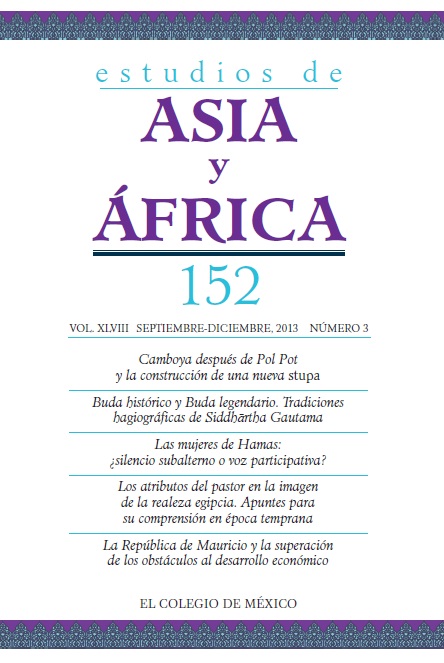Abstract
The “Arab Spring” was a social movement characterized by a series of popular uprisings and protests against the governing elite’s abuse and oppression. The movement swept through several countries in the Middle East and North Africa region. This article focuses specifically on Egypt and the ideological transformation in a particular sector of the population, the youth. The study aims to comprehend why the younger generations acted as they did and how this minority reached a more universal cosmovision that goes beyond religion and nationalism and formulates a new concept of the human being.
References
Abdallah Ahmed, “The Egyptian generation of 1967: Reaction of the young to the national defeat”, en Roel Meijer, Alienation or Integration of Arab Youth, Richmond, Curzon Press, 2000.
Agence France-Presse, “Egypt braces for nationwide protests”, 25 de enero, 2011. [[http://web.archive.org/web/20110209080050/http://www.france24.com/en/20110125-egypt-braces-nation-wide-protests.]
Amin, Sajeda y Nagah H. al-Bassusi, “Education, Wage Work, and Marriage: Perspectives of Egyptian Working Women”, Journal of Marriage and Family, vol. 66, núm. 5, número especial: International Perspectives on Families and Social Change, diciembre, 2004, pp. 1287-1299.
BBC News, “Egyptian Police Sued for Boy’s Death”, 13 de agosto, 2010. [http://news.bbc.co.uk/2/hi/africa/6943704.stm.]
Bennani-Chraïbi, Mounia, “Youth in Marocco: An indicator of a changing society”, en Roel Meijer, Alienation or Integration of Arab Youth, Richmond, Curzon Press, 2000.
Central Agency for Population Mobilization and Statistics, “Population Clock (July 2008)”. [http://web.archive.org/web/20100908090727/http://www.msrintranet.capmas.gov.eg/pls/fdl/tst12e?action=&lname=.]
Choi, Jay Pil y Marcel Thum, “Corruption and The Shadow Economy”, International Economic Review, vol. 46, núm. 3, agosto, 2005, pp. 817-836.
CNN.com, “Muslim Brotherhood undergoing Generational Rift in Egypt”, 2 de julio, 2011. [www.cnn.com/2011/WORLD/meast/06/30/egypt.muslim.brotherhood/index.html.]
Courbage, Youssef, “The demographic inflection of the southern Mediterranean: Reasons for optimism”, en Roel Meijer, Alienation or Integration of Arab Youth, Richmond, Curzon Press, 2000.
Daily News Egypt, “Daily News Egypt: Egypt unemployment rate reaches 11.8 pct”, 30 de agosto, 2011. [www.egypt-business.com/Web/details/Egypt-unemployment-rate-reaches-118-pct/1002.]
Delwin, A. Roy, “The Hidden Economy in Egypt”, Middle Eastern Studies, vol. 28, núm. 4, octubre, 1992, pp. 689-711.
El País, “Egipto debe ser un país laico”, 15 de febrero, 2011. [http://elpais.com/diario/2011/02/15/internacional/1297724405_850215.html.]
El País, “El futuro político del mundo árabe y la laicidad”, 4 de marzo, 2011. [http://elpais.com/diario/2011/03/04/opinion/1299193204_850215.html.]
El País, “¿Islamistas de nuevo cuño?”, 1 de diciembre, 2011. [http://internacional.elpais.com/internacional/2011/12/01/actualidad/1322772475_967255.html.]
Erlich, Haggai, “Youth and Arab Politics: The Political Generation of 1935-36”, en Roel Meijer, Alienation or Integration of Arab Youth, Richmond, Curzon Press, 2000.
Espinosa, Ángeles, “La oposición laica se abre paso en Egipto”, El País, 29 de enero, 2011.
Hall, Stuart, “The Local and the Global: Globalization and Ethnicity”, en Anthony King (ed.), Culture, Globalization and the World System: Contemporary Conditions for the Representation of Identity, Minneapolis, University of Minnesota Press, 1997, pp. 19-41.
Ibrahim, Barbara y Hind Wassef, “Caught between Two Worlds: Youth in the Egyptian Hinterland”, en Roel Meijer, Alienation or Integration of Arab Youth, Richmond, Curzon Press, 2000.
Khalifa, Mona; Julie DaVanzo y David M. Adamson, Population Growth in Egypt - A Continuing Policy Challenge, documento temático 183, Santa Mónica, Rand Corporation, 2000.
Lister, Tim, “Many similarities in Arab Spring, European chaos”, CNN.com, 21 de noviembre, 2011. [www.cnn.com/2011/11/21/world/europe/arab-spring-europe.]
Martin Muñoz, Gema, “Arab Youth Today: The Generation Gap, Identity Crisis and Democratic Deficit”, en Roel Meijer, Alienation or Integration of Arab Youth, Richmond, Curzon Press, 2000.
Martinez, Luis, “Youth, the Street and Violence in Algeria”, en Roel Meijer, Alienation or Integration of Arab Youth, Richmond, Curzon Press, 2000.
Meijer, Roel, Alienation or Integration of Arab Youth, Richmond, Curzon Press, 2000.
Nasir, Sudirman, “Youth Unemployment and Youth Revolution”, The Jakarta Post, 1 de marzo, 2011. [www.thejakartapost.com/news/2011/02/28/youth-unemployment-and-youth-revolution.html.]
Onodera, Henri, “The Kifaya Generation. Politics of Change among Youth in Egypt”, Suomen Antropologi: Journal of the Finnish Anthropological Society, vol. 34, núm. 4, invierno, 2009, pp. 44-64.
Oxford Business Group, The Report: Egypt 2007, enero, 2007.
Reisenwitz, Timothy H. y Bob D. Cutler, “Dogmatism and Internet Usage by University Students: Are Dogmatics Late Adopters?”, Journal of Marketing Theory and Practice, vol. 6, núm. 3, 1998, pp. 43-50.
Reske, Henry J., “Egypt’s Poverty, Unemployment, Push Youths toBreaking Point”, NewsMax, 31 de enero, 2011. [www.news-max.com/Newsfront/Egypt-poverty-unemployment-un-rest/2011/01/31/id/384555]).
Robertson, Jordan, “The day part of the Internet died: Egypt goesdark”, The Washington Times, 28 de enero, 2011. [www.was-hingtontimes.com/news/2011/jan/28/day-part-internet-died-egypt-goes-dark/.]
Rooke, T., “Escape from the Family: A Theme in Arabic Autobiography”, en Roel Meijer, Alienation or Integration of Arab Youth, Richmond, Curzon Press, 2000.
Rutherford, Bruce, Egypt after Mubarak: Liberalism, Islam, and Democracy in The Arab World, Princeton, Princeton University Press, 2008.
Shapiro, Andrew L., “The Internet”, Foreign Policy, núm. 115, 2006, pp. 14-27.
The Guardian, “US Embassy Cables: Police Brutality in Egypt”, 28 de enero, 2011 [www.guardian.co.uk/world/us-embassy-cables-documents/187359]
Transparency International, Corruption Perceptions Index 2010. [http://web.archive.org/web/20101027163524/http://www.transparency.org/policy_research/surveys_indices/cpi/2010/results.]
U.S. Department of State, 2009 Human Rights Report: Egypt, 2011. [http://web.archive.org/web/20100331230352/http://www.state.gov/g/drl/rls/hrrpt/2009/nea/136067.htm.]
Van Leeuwen, R., “The Lost Heritage: Generations Conflicts in Four Arabic Novels”, en Roel Meijer, Alienation or Integration of Arab Youth, Richmond, Curzon Press, 2000.
This work is licensed under a Creative Commons Attribution-NonCommercial-NoDerivatives 4.0 International License
Copyright 2022 Estudios de Asia y África


